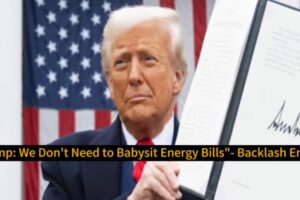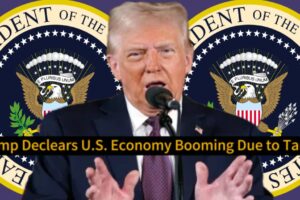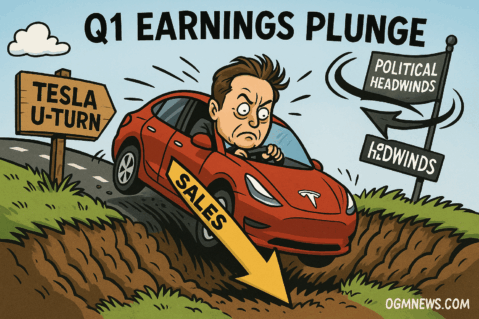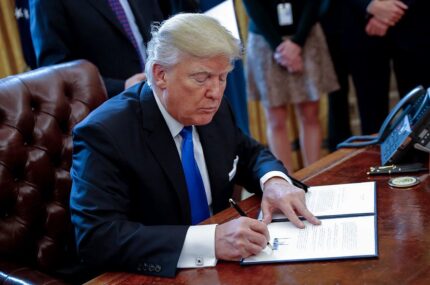Tesla earnings in the first-quarter 2025 report delivered sobering news for investors and stakeholders. The electric vehicle (EV) giant reported $19.3 billion in revenue, missing Wall Street’s forecast of $21.1 billion. This marks a 9% year-over-year decline and underscores the growing list of challenges Tesla faces in an increasingly competitive and politically charged environment.
Net income plummeted by a staggering 71%, dropping to just $409 million. Tesla earnings per share (EPS) were reported at $0.27, well below the projected $0.39. Analysts had already tempered expectations leading up to the announcement, but the results still landed with a thud. It’s no coincidence that Tesla released these numbers only after the stock market had closed—likely to avoid immediate volatility and investor panic.
Adding to the unease, Tesla’s operating margin fell sharply, raising concerns about efficiency and cost controls amid softening demand and ongoing pricing pressure. The numbers reflect a broader slowdown in the EV market and increasing uncertainty about Tesla’s strategic direction.
Tesla Earnings: Automotive Revenue and Deliveries Decline Sharply
The most concerning figure in the report was the 20% year-over-year decline in automotive revenue. Tesla’s core business brought in just $13.9 billion this quarter, reflecting a sharp drop in vehicle deliveries and average selling prices. The company delivered 336,681 vehicles in Q1 2025, a 13% decline from the same period in 2024. Production stood at 362,615 units.
Industry analysts point to a combination of factors for the drop, including high inflation, intense price competition from Chinese EV makers, and a saturated U.S. market. Additionally, Tesla’s continued price cuts, while aimed at driving volume, are increasingly eating into profitability.
These trends suggest that Tesla’s once untouchable dominance in the EV space is under pressure from both new players and legacy automakers pivoting aggressively into electrification.
Political Backlash: Musk’s Government Role Sparks Public Outcry
Tesla earnings downward spiral is expected amidst a growing chorus of critics pointing to CEO Elon Musk’s political involvement as a major driver of Tesla’s recent troubles. His appointment to the Trump administration’s Department of Government Efficiency (DOGE) has drawn fierce backlash from segments of the public and consumer base.
Once hailed as a visionary of clean energy and technological progress, Musk now faces accusations of alienating Tesla’s environmentally conscious, progressive core audience. Protests erupted at Tesla showrooms in several cities, while reports of vandalized Tesla vehicles spiked following his DOGE appointment.
Social media influencers, environmental activists, and public figures have distanced themselves from the brand. “Tesla’s brand has become collateral damage in Elon Musk’s political journey,” declared The Washington Post. Once a darling of Silicon Valley and Gen Z, Tesla’s identity is now muddled and polarizing.
Tesla Earnings: Investor Anxiety and Stock Market Volatility
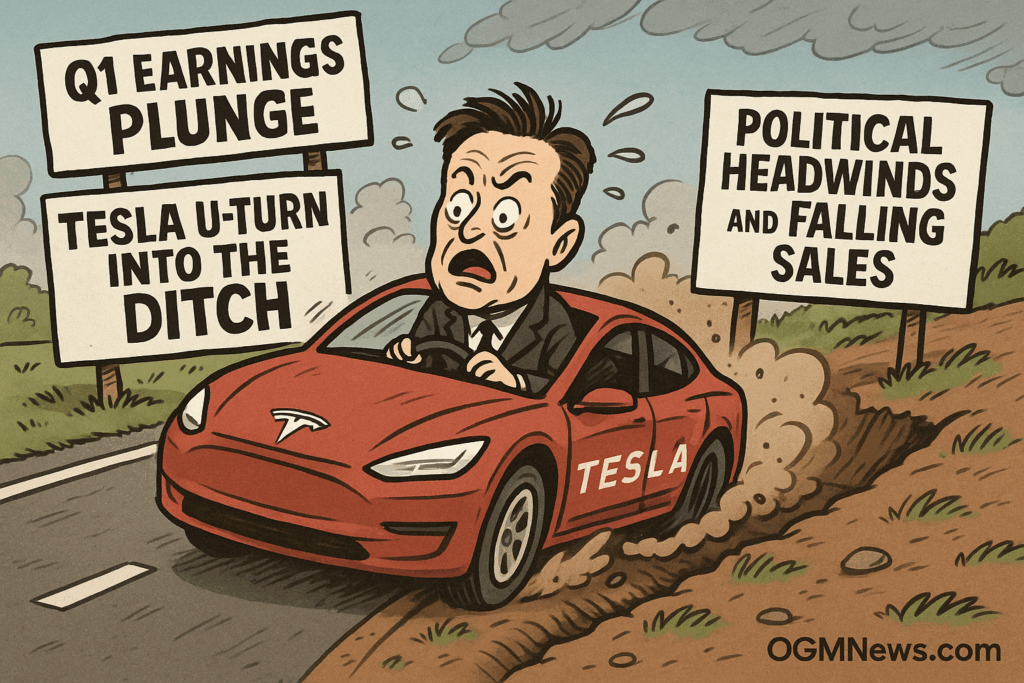
The market reaction to Tesla’s Q1 report was swift and brutal. Shares dipped in after-hours trading as investors digested the underwhelming earnings and the implications of Musk’s political distractions. Institutional investors, in particular, have grown wary of a CEO seen as straddling business and politics too recklessly.
Large investment funds have reportedly scaled back their Tesla holdings in recent months. Their concerns? Musk’s time away from Tesla operations, unpredictable public statements, and the risk of political blowback affecting regulatory relations and brand value.
Some analysts argue that Tesla’s governance model—heavily reliant on Musk’s leadership—is now a liability. Calls are mounting for a more structured, focused executive team to manage daily operations while Musk handles high-level innovation.
Market Competition and Global EV Headwinds
Tesla Earnings: Beyond politics, Tesla is also facing mounting external pressure from global competitors. In China, local giants like BYD and Nio are offering compelling alternatives at lower prices. In Europe, VW, Stellantis, and BMW are rapidly gaining EV market share.
U.S. rivals like Rivian and Lucid are chipping away at Tesla’s urban and luxury segments. Their apolitical, climate-forward branding has resonated with a demographic Tesla once dominated. Compounding the issue, U.S.-China tensions have further complicated Tesla’s position in Asian markets, making its political affiliations even more problematic.
Sales in Tesla strongholds like California and New York have notably declined, as progressive buyers pivot to brands they perceive as more aligned with their values.
Company Response: Musk Vows to Refocus on Tesla
Tesla Earnings: In response to growing criticism and financial underperformance, Elon Musk has announced plans to scale back his involvement in DOGE starting May 2025. “It’s time to refocus on Tesla’s mission,” Musk stated in a post-earnings call, acknowledging the need to reestablish public trust and organizational stability.
Tesla also highlighted upcoming launches, including a budget-friendly Model Y and the highly anticipated rollout of a driverless robotaxi service in Austin, Texas. These initiatives aim to rejuvenate investor interest and spark consumer excitement.
While these product developments signal forward momentum, analysts warn that Tesla’s reputation won’t recover overnight. Rebuilding confidence among consumers and shareholders will require consistent, focused leadership and a clear strategic roadmap.
Financial Position: Cash Strong, But Caution Ahead
Despite the rocky quarter for Tesla earnings, the EV manufacturer remains financially sound in the short term. The company ended Q1 with a strong cash position—$37 billion in cash, cash equivalents, and investments. It also generated $664 million in free cash flow, underscoring its ability to weather short-term challenges.
However, if revenue trends continue downward, even Tesla’s war chest could come under pressure. Key metrics like gross margin, operating income, and capital expenditures will be closely watched in upcoming quarters.
Tesla’s long-term bet on autonomy, energy storage, and robotics may still pay off. But for now, the company is in damage-control mode—juggling political fallout, market skepticism, and stiff competition in a fast-evolving EV landscape.
Tesla Earnings in the Q1 2025 report lays bare the consequences of brand misalignment, executive distraction, and competitive vulnerability. While the company still commands a strong balance sheet and ambitious roadmap, its short-term prospects are clouded by public discontent and operational slowdown. Whether Elon Musk’s partial retreat from politics can course-correct Tesla remains to be seen—but for now, the electric dream is facing a high-voltage reality check.






